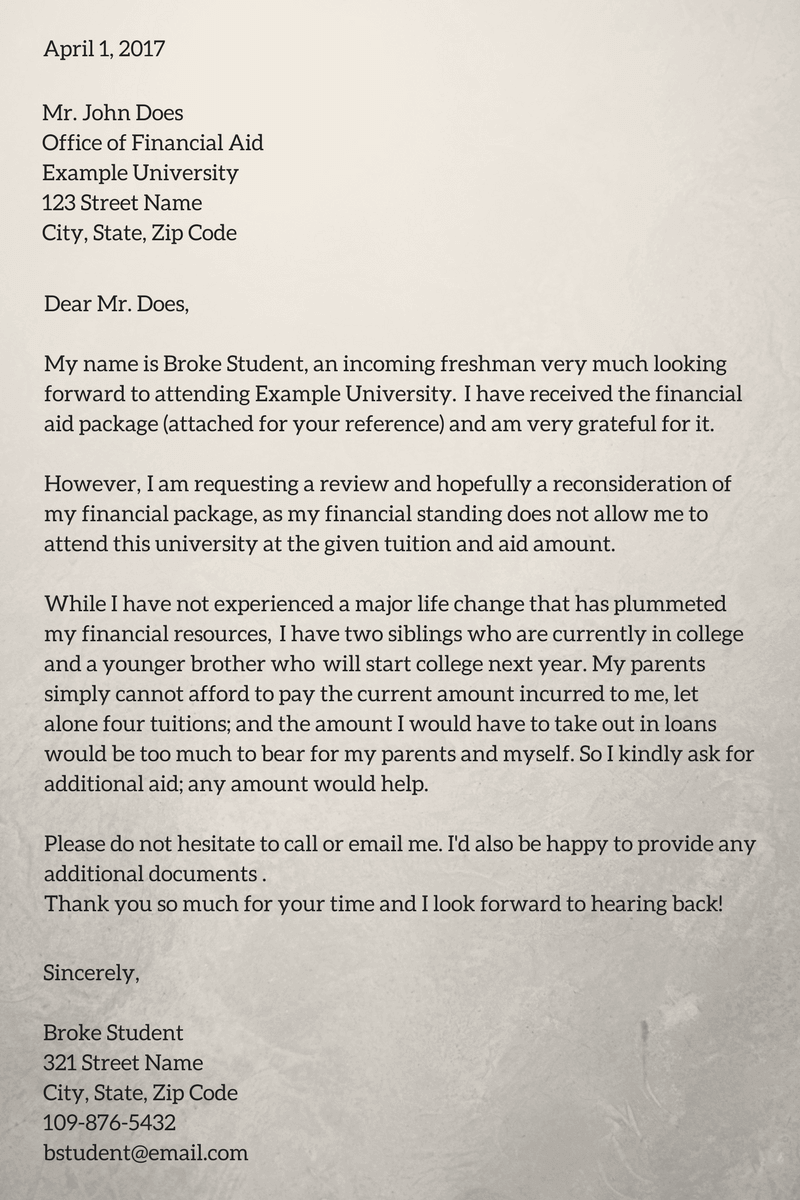[alert-announce]*Financial Aid Appeal is not just for incoming freshmen; students of all grades can appeal their financial aid packages any time during their college years.*[/alert-announce]
Acceptance letters come with a price tag.
That’s not a surprise.
But what may come as a surprise to many students and families is that colleges are more likely than you think to say “yes” to your request for more aid. And that is exactly what a financial aid appeal is — a request for help.
Before you appeal your financial aid package, though, here are three things to remember:
- You are not entitled to more aid (or even the aid that’s already given to you). Colleges don’t have to give you more aid; heck, they don’t even have to accept you!
- A financial aid appeal is not so much a negotiation as it is a “reconsideration” on their part.
- As obvious as it sounds, it is the responsibility of the student to initiate the appeal.
Note to Parents: While you can — and should, if possible — assist your child through this process, please do NOT write the letter for them — colleges will not look at this favorably!
If you’re wondering why colleges would give you more money, here are two obvious answers:
- They want you (which is why they’ve accepted you). And if they want you to attend their school, they would be willing to give you the means to do so.
- Colleges accept a certain number of applicants each year, and their job is not finished until the accepted students enroll in their institution; while they can always reach out to the waitlisted candidates, they will try their best to get the accepted students to enroll first.
So as long as your request is reasonable, colleges or universities will likely consider your request for more aid!
Here is a Sample Financial Aid Appeal Letter:

So … how do you go about writing a financial appeal letter?
Firstly, for need-based aid (or the reconsideration of it), contact the Financial Aid Office.
Here are the steps you should take to request more aid:
1. Research the grants and scholarships available, as well as the guidelines for appeal processes.
Go to the financial aid section of your school’s website, or simply Google “(School Name) Scholarships and Grants” to find the page. Each school has different sets of scholarships and grants, programs and awards, and policies. Some scholarships/grants are available to all students, and some have very specific and limiting criteria. The appeal processes also differ from school to school. Check to see if there are specific forms you need to fill out before contacting the school. It is your responsibility to learn about the different options and requirements, so do your part before asking for help! And remember, there are merit-based scholarships as well as need-based ones.
2. Find the right contacts (see the department listing on the school’s website).
- If you can, appeal in person (make sure to make an appointment first!). According to Steven Sirot and David Slater, cofounders of College Benefits Research Group, “The effort to meet in person shows interest on your part and can carry more weight than a letter. Remember, it’s more difficult to refuse someone in person than on paper.”
- If you’re writing by email, address a specific person (or people) who work in the office. Rather than sending multiple emails to different people, you should send one email to multiple recipients. That way, everyone in the office is informed about the case (or at least has a record of the request), and the most appropriate person can get back to you. Another good idea is to request a follow-up appointment with a financial aid offer, either in person or over the phone.
3. Provide all the necessary information (like your current status of award and any forms you filled out) and explain your financial situation/circumstances.
[MUST SEE: Email Etiquettes]
- Since you received your financial aid package, have you or your family experienced a drastic life change that has impacted your financial status (e.g., loss of a job, pay cut, disability/injury/death, unexpected high medical expenses, etc.)? If so, definitely highlight these.
- If there was no major life change but you still feel that the financial aid award is inadequate, write a sincere letter that demonstrates your need for more aid and also your willingness (and humility) to ask for help. But first, assess the fairness of your financial aid package by comparing it to the historical financial awards of the college (Percentage of Need Met).
- Also indicate the expected family contribution. How much can you and your family pay out of pocket, yearly? Be realistic but don’t lie — if you know that you can pay about $5,000 a year, don’t say that you can only pay $1,000. This isn’t a pity party.
4. Prepare documentation of financial information.
After reviewing your appeal letter, the financial aid office can exercise “professional judgment” granted by Higher Education Act Section 479(a)[“HEA”] and decide to award you more financial assistance. You may need to provide evidence of your financial standing before a decision is made, so have these documents ready.
[divider]
Secondly, to increase your chance of receiving more aid, also contact the Admissions Office.
Reaching out to the Financial Aid Office is only half the work; students should also reach out to the Admissions Office. The Admissions Office, as the name suggests, is concerned with admitting students who they believe will better their institution (like you!). They will want to help you as much possible.
Here are the things you should include in your (separate) letter of appeal to the Admissions Office:
1. Ask them if there are ways for you to get additional aid, or if they can increase the amount of your current merit aid(s).
According to college aid experts, a typical increase in merit aid is between $1,000 and $5,000. The admissions officials may not be as informed about the financial aid processes, but they can give you information about additional scholarships or grants you may qualify for. Also, be sure to ask if the aid is renewable. You don’t want to assume that you will receive the aid amount each year, when in reality it is a one-time award. This is especially important, as tuition will likely increase each year while the amount of aid will either stay the same or decrease.
2. Mention a competing offer.
Colleges are not an exception when it comes to “matching the price.” Do you have a better offer from another college? Mention the amount the competing college is offering you (or simply indicate that it is more than what you’re being offered at the target school), and make it clear that you would prefer to attend the target school if additional aid is given to you. An additional pro tip (that I’ve used in my appeal letter to Fordham University which got me an additional $7,000) is to let the college know that if you don’t get additional aid, you will have to choose another college. I don’t remember the exact wording I used in my letter of appeal, but it was something like this: “I’d love to attend Fordham University, but without additional aid, I’m going to have to choose X University, where I am offered $Y in scholarship.” And it worked! I received an additional $7,000 in scholarship for all four years, which saved me $28,000!
3. If you’re not pressed for time, don’t make the deposit until they get back to you.
Even if you’re committed to the college, you shouldn’t say so! Making the deposit before you receive a response to your financial appeal will only lower your chance of receiving more aid because the college will rightly assume that you will attend the college whether or not they give you the additional aid. Instead, let the college know, by NOT making the deposit, that your decision to enroll will depend on whether or not you get more aid.
After you have done your part, wait patiently but act diligently.
Don’t expect to hear back the day after you’ve emailed the Financial Aid and Admissions Offices; give them a solid week or two to respond. If you’re pressed for time, send a follow-up email or call the offices to request further assistance. Make sure to apply Email Etiquette Tip #7 when you follow up.
Once they respond, it’s your turn to act again. Provide whatever documents they require and follow all of their instructions diligently. Make sure to thank them for their assistance, and go get that money!
RELATED ARTICLES:
NitroScore: The Affordability Calculator Every College Students and Their Parents Need



